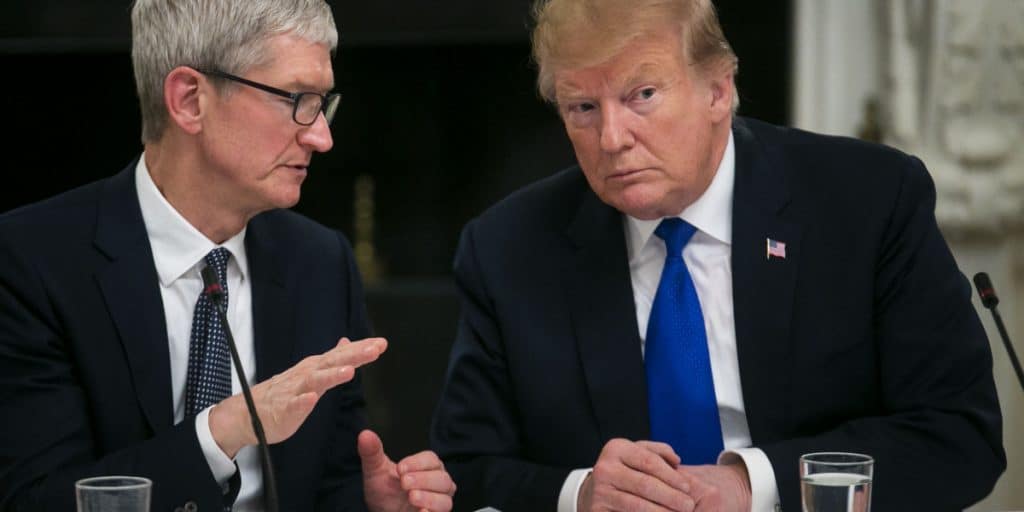Donald Trump’s effort to tout U.S. economic process will clash together with his trade war on Wednesday when he visits an Apple Inc. factory in Texas, where Tim Cook will probably plead in person to stay Macs and iPhones free from tariffs.
Trump’s visit to the Austin factory, where Apple contractor Flex Ltd. assembles a number of the company’s laptops, is meant to spotlight the expansion in U.S. manufacturing jobs since his inauguration. Trump has made U.S. economic process the centerpiece of his campaign for re-election in 2020.
But the stop also will highlight the impact of Trump’s trade war with Beijing. The administration is currently considering whether to exempt Apple goods from a 15% tariff that took effect Sept. 1, covering about $110 billion in Chinese imports including the Apple Watch, AirPods, and parts for the iPhone.
Cook, Apple’s CEO, has cultivated a private relationship with both Trump and his daughter, Ivanka, who may be a White House senior adviser. He’s dined twice with Trump at his Bedminster, New Jersey, golf resort, attended a state dinner for French President Emmanuel Macron, and even traveled with Ivanka Trump to go to schools in Idaho. But that rapport is going to be tested if Trump can’t reach what he calls a “phase-one” trade effect Chinese President Xi Jinping that might roll back U.S. tariffs.
A round of Trade tariffs set to require effect in December would be even more painful for Apple, including a 15% levy on the iPhone itself.
Apple tariffs
Trump and Cook decide to tour the Austin facility together — a factory that White House spokesman Judd Deere said was “made possible through the president’s pro-growth and pro-business economic policies.” Treasury Secretary Steven Mnuchin and top White House economic adviser Larry Kudlow, two key figures on trade, will accompany Trump, as will senior advisers Jared Kushner and Ivanka Trump.
“We’re building the Mac Pro — Apple’s most powerful computer ever — right here in Austin because we believe the facility of yank innovation,” Cook said during a statement distributed by the White House.
The White House hasn’t said whether Trump plans to debate Apple’s request for tariff waivers with Cook, and Apple declined to comment beyond previous statements.
In its appeal for a waiver, Apple claims it cannot identify a producing location outside China ready to meet U.S. demand for the products or components that might be subject to tariffs.
Apple previously received tariff waivers on 10 of 15 requested items in September. Soon afterward, the corporate announced it might assemble its new Mac Pro in Austin, Texas, instead of China. Apple said at the time that the choice was “made possible” by the exclusions, including components for the Mac Pro.
Cook’s Leverage
The sequence of events showed that Cook has some leverage over Trump. The president said in August that Cook personally appealed to him by arguing that tariffs would help Apple’s foreign competition.
“I have tons of respect for Tim Cook. And Tim was lecturing me about tariffs. And, you know, one among the items — and he made an honest case — is that Samsung is their number-one competitor, and Samsung isn’t paying tariffs because they’re based in South Korea,” Trump told reporters in August.
Trump laid out his economic argument for re-election last week during a speech at the Economic Club of latest York, highlighting his tax cuts and deregulation as key catalysts for the economic process. The U.S. added about 443,000 manufacturing jobs since January 2017, the month Trump took office, though factories have shed about 41,000 positions within the last two months.
Apple had planned to maneuver Mac Pro assembly to China after a variety of problems plagued the Austin facility, including trouble retaining skilled labor. The factory produced a previous version of the pc starting in 2013.
While Cook has said his company supports 2.4 million jobs within the U.S., only a little fraction are for final assembly. Earlier this decade, the corporate assembled a little number of iMacs at a facility in Elk Grove, California but it currently doesn’t assemble any product within the U.S. outside of Texas. Apple has offices in San Diego, San Francisco, New York, Austin, Denver, Seattle, Florida, and Boston.
The company announced in Dec. 2018 plans to take a position of $1 billion in its existing Austin campus in order that it could employ as many as 15,000 workers, consistent with the White House.
Check More Content Down Below –
How To Become A Better Leader | 5 Tips
Crisis Management Skills For Business Leaders | Few Crisis Management Skills
